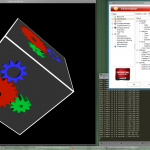Its quite some work to get to a reasonable schedule for a FOSS conference done. You want a balanced program with topics where all visitors can find their interests in. Moreover the level of the talks must be taken care of as well as there should be gravitation centers for key topics within the community. As you usually also seek out for new community members with a conference, some topics which attract new people are also a very good idea. And all that needs to be sorted between rooms with different sizes, the times people can be around, the tracks you think are useful on the event and such. Quite some parameters to take into account.
That said, I am very happy that we could issue the schedule for the openSUSE Conference 2011 today.
For conference organization there is tooling. Or should I say: Should be? Given the huge amount of FOSS conferences around, the number of free alternatives of conference organization systems is fairly small. We decided to go again with Indico, a python based system developed by CERN. It provides support for the whole conference life cycle such as the call for abstracts, the internal judging process, the scheduling and such. With nice help from the developers we got it running smoothly and integrated. Sometimes the interface is not really straightforward, but finally its a very feature rich yet flexible tool that feels like it has managed some large (CERN) conferences already.
For the openSUSE conference 102 contributions were scheduled into four rooms in four days, so it will be quite a exhausting event :-). Unfortunately we still had to reject quite some submissions as the program is stuffed already. Please bear with us.
This year we are really happy to have a joint event with the former SUSE Labs Conference for the first time. That not only brings a lot of high potential speaker to the event, but also much more low level topics around kernel, gcc and such. I think we lacked that a bit at the last conference. Also cool that Greg KH, well known kernel hacker, will enlighten us with a keynote.
Beside the low level topics, we will hear a lot about community affairs, such as social skills for geeks or impressions from our ambassadors work. Another big block is around packaging and the organization and management of openSUSE Factory, our next stable distribution. Some knowledge sharing is always appreciated, I personally look forward to “Working Effectively with GIT” as I am still dreaming of svn in the nights 😉 And what we need to continue to grow our identity as openSUSE project are contributions around our setup and the relationship to SUSE, the commercial offering of SUSE and the importance of openSUSE in that. Michael Miller, SUSE Vice President of Global Alliances & Marketing, will give a keynote here, and there are other talks in that space.
The motto of osc2011 is rwx³ which is a synonym of the idea of interactivity and creativity on the conference. That is a success already as more than the half of the contributions to the conference are BoFs, Workshops or hacking sessions. You do not have to fear to fall asleep in lengthy talks instead you will do stuff 😉
And finally there is the venue. If you have been to the conference last year I need to say its different this year. Nobody will serve you Coke, instead with Zentrifuge you are at a place where usually artists work and do exhibitions. This spirit of hands-on work quickly jumped over on us as the orga team and we are sure that spirit is good for openSUSE 🙂
I hope you have registered for oSC 2011 already….




